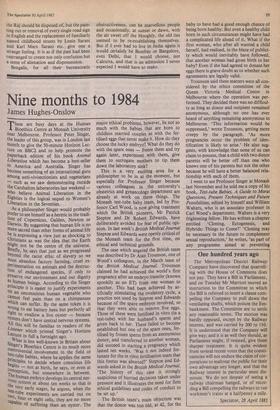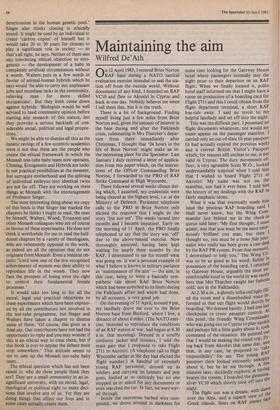Nine months to 1984
James Hughes-Onslow
These are busy days at the Human Bioethics Centre at Monash University near Melbourne. Professor Peter Singer, the leader of this group, was in London last month to give the 50-minute Horizon Lec- ture on BBC2 and to help promote the Paperback edition of his book Animal Liberation which has become a best-seller in America and Australia. Singer has become something of an international guru among anti-vivisectionists and vegetarians
such as we saw demonstrating outside the Carshalton laboratories last weekend who believe Animal Liberation in the Eighties is the logical sequel to Women's Liberation in the Seventies.
As a philosopher Singer would probably prefer to see himself as a heretic in the tradi- tion of Copernicus, Galileo, Newton or Darwin. By suggesting that human life is no more sacred than other forms of animal life he is expressing a view just as shocking to Christians as was the idea that the Earth might not be the centre of the universe. Briefly, he says that just as we progressed beyond the racist ethic of slavery so we must abandon factory farming, cruel ex- perimentation on animals and the destruc- tion of endangered species, if only to preserve our environment and our dignity as human beings. According to the Singer Principle it is easier to justify experiments °n an unconscious human vegetable who Cannot feel pain than on a chimpanzee which can suffer. By the same token it is Wrong to eat battery hens but perfectly all right to swallow a live oyster — because oYsters don't have central nervous systems. All this will be familiar to readers of the Listener which printed Singer's Horizon Lecture in full a fortnight ago. What is less well-known in Britain about Singer's Bioethics Centre is its much more controversial involvement in the field of test-tube babies, where he applies the same principles to decide where conscious life begins — not at birth, he says, or even at Le,nception, but somewhere in between. The human embryo develops its central ner- vous system at about ten weeks so that in he
very early stages, he argues, when the
test-tube experiments are carried out on two, four or eight cells, they are no more capable of suffering than an oyster. The
major ethical problems, however, lie not so much with the babies that are born to childless married couples as with the fer- tilised eggs that never make it. How do they choose the lucky embryo? What do they do with the spare ones — freeze them and try again later, experiment with them, give them to surrogate mothers to tip them down the laboratory sink?
This is a very exciting area for a philosopher to be in at the moment, but especially for Professor Singer because various colleagues in the university's obstetrics and gynaecology department are already at work on these things. The Monash test-tube baby team, led by Pro- fessor Carl Wood, is now giving treatment which the British pioneers, Mr Patrick Steptoe and Dr Robert Edwards, have deliberately avoided for fear of public opi- nion. In last week's British Medical Journal Steptoe and Edwards were openly critical of the Monash team for the first time, on ethical and technical grounds.
The case which angered the British team was described by Dr Alan Trounson, one of Wood's colleagues, in the March issue of the British Medical Journal. Trounson claimed he had achieved the world's first pregnancy after an embryo transfer (known spookily as an ET) from one woman to another. This had been achieved by ar- tificially stimulating the ovulatory cycle, a practice not used by Steptoe and Edwards because of the spare embryos involved, so that they were able to remove five eggs. Three of these were fertilised in vitro (in a test-tube) with her husband's sperm and given back to her. These failed to become established but one of the spare ones, fer- tilised by frozen sperm from an anonymous donor, and transferred to another woman, did succeed in starting a pregnancy which lasted ten weeks. 'Was it not indeed for- tunate for the in vitro fertilisation team that this foetus was aborted?' Steptoe and Ed- wards asked in the British Medical Journal. 'The history of this case is strongly suspicious of hurried decisions taken under pressure and it illustrates the need for firm ethical guidelines and codes of conduct to be set up.'
The British team's main objection was that the donor was too old, at 42, for the baby to have had a good enough chance of being born healthy. But even a healthy child born in such circumstances might have had a complicated life ahead of it. What if the first woman, who after all wanted a child herself, had realised, in the blaze of publici- ty which would inevitably have followed, that another woman had given birth to her baby? Even if she had agreed to donate her eggs there is grave doubt as to whether such agreements are legally valid.
Trounson said these matters were all con- sidered by the ethics committee of the Queen Victoria Medical Centre in Melbourne where the operation was per- formed. They decided there was no difficul- ty as long as donor and recipient remained anonymous, although no one has ever heard of anything remaining anonymous in Melbourne. 'This information would be suppressed,' wrote Trounson, getting more creepy by the paragraph. 'As more pregnancies occur the problem of iden- tification is likely to arise.' He also sug- gests, with knowledge that none of us can claim to possess, that a child with two donor parents will be better off than one who knows one of his parents but not the other because he will have a better balanced rela- tionship with each of them.
I went to see Professor Singer at Monash last November and he sold me a copy of his book, Test-tube Babies, A Guide to Moral Questions, Present Techniques and Future Possibilities, edited by himself and William Walters, who is an associate professor in Carl Wood's department. Walters is a very frightening fellow. He has written a chapter entitled 'Cloning, Ectogenesis, and Hybrids: Things to Come?' Cloning may be necessary in the future to complement sexual reproduction,' he writes, 'as part of any programme aimed at preventing
deterioration in the human genetic pool.' Singer also thinks cloning is ethically sound. It might be used by an individual tc create 'carbon copies' of himself but il would take 20 or 30 years for clonees to play a significant role in society — so that's all right, he says. Neither of them sees any convincing ethical objection to ecto- genesis — the development of a baby in completely artificial circumstances without a womb. Walters puts in a few words in favour of animal-human hybrids which he says would 'be able to carry out unpleasant jobs and mundane tasks in the community, relieving man for more skilled occupations'. But they both come down against hybrids: 'Biologists would be well advised to heed community opinion before starting any research of this nature, lest they provoke a serious backlash of con- siderable social, political and legal propor- tions.'
We might be able to dismiss all this as the lunatic ravings of a few eccentric academics were it not that these are the people who create the ethical framework in which the Monash test-tube baby team now operates. Cloning, Ectogenesis and Hybrids are lucki- ly not practical possibilities at the moment, but surrogate motherhood and the splitting of individual embryos into identical twins are not far off. They are working on these things at Monash with the encouragement of Professor Singer.
The most interesting thing about my copy of this book is that Singer has marked the chapters he thinks I ought to read, the ones by himself, Walters, Wood, Trounson and other Monash colleagues who are of course in favour of these experiments. He does not think it worthwhile for me to read the half- dozen chapters by a variety of theologians, who are vehemently opposed to the work, as indeed are all the opinions that do not originate from Monash. Even a feminist ob- jects: 'Until now one of the few recognised achievements of women was their ability to reproduce life in the womb. They now face the prospect of losing even the right to control their fundamental female processes.'
It would take too long to list all the moral, legal and practical objections to these experiments which have been express- ed by all the contributors not involved in the test-tube programme, but Singer and Walters have taken a chapter to dismiss some of them. 'Of course, this gives us a final say. Our contributors have not had the opportunity to reply and you may wonder if this is an ethical way to treat them, but if this book is ever to appear the debate must stop somewhere.' This attitude seems to me to sum up the Monash test-tube baby team.
The ethical question which has not been raised is: who do these people think they are? They are a small community in an in- significant university, with no moral, legal, theological or political right to make deci- sions that involve any of us. Yet they are doing things that affect our lives and in some cases actually create them.











































 Previous page
Previous page